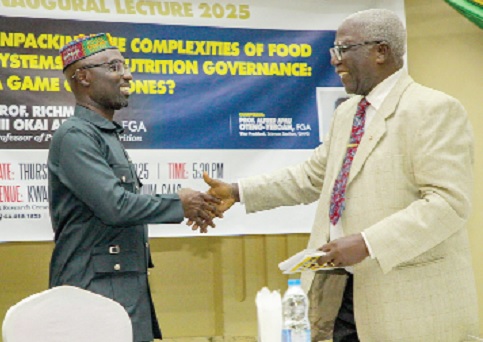A Professor of Public Health Nutrition at the University of Ghana, Prof. Richmond Nii Okai Aryeetey, has called for the establishment of a National Nutrition Commission to provide leadership and effective coordination in addressing the country’s growing food and nutrition challenges.
He said that the country’s food system, which includes production, processing, storage and consumption, had become more complex but was still poorly governed.
The nutritionist said that this had resulted in many citizens lacking access to safe, nutritious and affordable food.
“In the early days of independence, Ghana had a National Food and Nutrition Board under the direct supervision of the President.
That level of priority is what we need again,” Prof. Aryeetey said.
He made this call last Thursday night in a lecture he delivered at the Ghana Academy of Arts and Sciences (GAAS) on the topic, “Unpacking the Complexities of Food Systems and Nutrition: A Game of Thrones”.
Present at the lecture were members of the GAAS, members of academia and some students from Accra Academy and the Accra Girls’ Senior High School.
Food insecurity, economic losses
Prof. Aryeetey recalled that when the country’s current nutrition policy was developed in 2012 and revised in 2014, 11 ministries were identified as having direct roles in improving nutrition, yet coordination and accountability had remained weak.
In spite of the country’s ability to produce enough food to feed its population, he revealed that about 2.1 million Ghanaians currently experience hunger, while nearly 15 million people were moderately or severely food insecure.
He described food insecurity as not only about the absence of food but also about affordability, accessibility and quality.
“If we go by the FAO definition, many of us would be food insecure,” he added.
Prof. Aryeetey stated that the cost of maintaining a healthy diet continued to rise.
“According to the Ministry of Food and Agriculture, it now costs about GH¢18 per person per day and in southern Ghana, as high as GH¢24 to meet dietary guidelines,” the professor of public nutrition added.
He explained that nutrient-rich foods such as fruits, vegetables and animal-source foods were increasingly unaffordable, while highly processed, calorie-dense foods were becoming cheaper and more accessible, leading to a rise in obesity and diet-related diseases.
Malnutrition
Citing UNICEF’s 2024 data, the professor of nutrition revealed that over 70 per cent of Ghanaian children under five, representing 2.4 million, suffered from food poverty.
“Seventeen per cent of children are stunted and while progress has been made, it is not fast enough,” he said, adding that malnutrition cost the country about $3 billion annually, equivalent to 6.4 per cent of Gross Domestic Product (GDP).
He also expressed concern about the double burden of malnutrition among women, noting that while 50 per cent of women of reproductive age were overweight or obese, many still suffered from anaemia and micronutrient deficiencies.
Call for reform
Prof. Aryeetey stressed that addressing nutrition challenges required political will, evidence-based policymaking and societal commitment.
He called on policymakers, researchers and civil society to reimagine food systems to ensure equitable access to safe and nutritious food for all Ghanaians.
“Food is not just for income, it’s for nutrition and survival.
If we continue to treat food systems purely as agricultural or economic ventures, we will continue to lose the nutrition battle,” he said.

